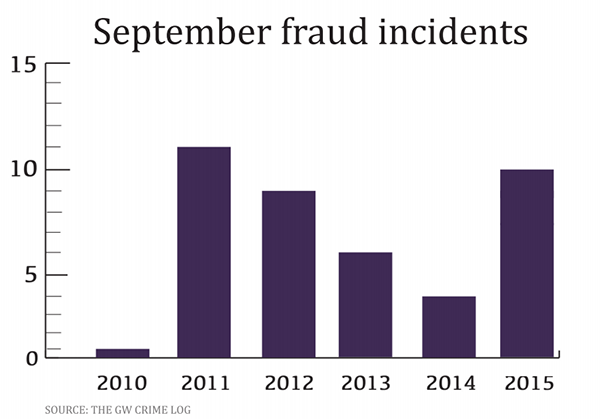Ten incidents of fraud have been reported to the University Police Department this year, the highest total since 2011.
Nine of the incidents were credit card fraud, according to the University crime log. Fraud is the use of deception for unlawful gain, and typically includes stealing a credit card or account information from another person and then making illegal charges.
Multiple incidents of fraud were reported in the Marvin Center on Sept. 4, according to the University’s crime log. Credit card fraud was also reported at off-campus locations six times, though the entries do not include the exact location.
Credit card fraud was also reported at Duquès Hall between 9 a.m. and 12:30 p.m. on Sept. 25, when a female student said her purse and wallet were stolen and noticed fraudulent charges on her credit card.
Two weeks ago, a female student in Munson Hall reported fraudulent charges on her credit card to UPD and said she received harassing phone calls and texts from someone claiming to be from the United Kingdom, according to UPD Captain Mark Balazik.
The crime log does not include information on the nature of the fraud, such as what exactly took place or if money was taken.
Eleven incidents were perpetrated in September 2011, while in September 2014, only four took place – 60 percent less than this September.
University spokeswoman Maralee Csellar said many of the incidents reported were students who noticed suspicious activity on their credit cards.
“When we receive these reports, we encourage students to contact their bank or credit card company for assistance. Many financial service agencies have tips and advice for protecting oneself from credit fraud,” Csellar said in an email.
James Ratley, the president and CEO of the Association of Certified Fraud Examiners said in order to crack down on fraud prevention, employees must be trained to check identification during transactions and should not be afraid to scrutinize customers.
Ratley added that law enforcement agencies like UPD could not implement policies that would be effective in deterring fraud because he said the prevention policies would need to come from the organizations selling products that could be purchased fraudulently. He said that police are typically “reactive” and would not play much of a role in fraud prevention.
“It has to be the policies of the retail establishment, policies of the University, not the law enforcement,” Ratley said.
Robert Siciliano, a personal security and identity theft expert, said the most common form of fraud on college campuses is new account fraud, which is when someone’s Social Security number is stolen and then used to open a new credit card account.
“It is the biggest issue for college students because they are giving their Social [Security number] out so often to so many people,” Siciliano said.
Siciliano said vendors can use several methods to reduce fraud, such as placing cameras on all registers and getting background checks for every employee on a register.
“They should be monitoring every single person on every type of register,” Siciliano said.
Sam Eppler contributed reporting.







